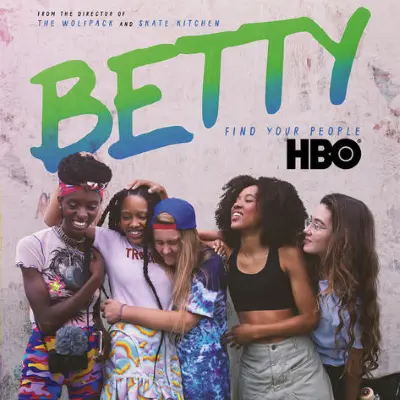HBO's Betty is an exhilarating glimpse inside the world of female skateboarders that's like nothing else on TV
-

Too much of television these days resembles something else. Even when a show emerges that is unique, it sparks imitators. "Not everything surprising is good, of course: The phrase 'I can’t believe that got made' is more often attached to bad programs than good ones," says Robert Lloyd. "But when it is good, when a breath of fresh air blows in, I thank the television gods for whatever happy accidents and industrial calculations brought it to fruition. Betty, premiering Friday on HBO, is such a show. A series reboot of Crystal Moselle’s 2018 film Skate Kitchen, focusing on a group of young female skateboarders in New York City, it’s very much not what the network saves for Sunday night: expensive star-fronted projects made to create prestige and win Emmys, to take over social media and suck up press coverage for weeks on end. Betty has no stars, no sets. There are a few professional actors on hand, and the main cast have already appeared in the movie, but they are playing versions of themselves in a show built on their experience, and are good enough to make you question whether they are acting at all. Developed for television by Moselle with Lesley Arfin, it has a modicum of plot and a fair amount of normal human conflict but it is not dark, darkly comic, violent or fantastic. There is no nudity, that old HBO staple. There are drugs, of the semi-legal sort, but no drug addicts, or even drug problems. Its main themes are friendship, self-knowledge, identity, equality and freedom — which is to say, it’s a show about being young. It feels innocent, which is not to say naive. And it is appropriately, almost casually exhilarating."
ALSO:
- The biggest problem with Skate Kitchen, as a film, was that it felt too short to be truly immersive: "I wanted more," says Kerensa Cadenas. "This is something Betty remedies well — the shift to TV really benefits (writer-director Crystal) Moselle’s storytelling, allowing it the necessary space to breathe and grow. Betty is a kinda aimless hang show. The plot doesn’t propel forward; instead, it meanders pleasantly, as the characters roam around the city, leisurely chat with one another, flirt in line at Bushwick bars, and occasionally get into fights with other crews. Still, the show has several serious and compelling through lines: Me Too, race and class, blossoming romance. For me, one of the best parts of Betty was the deft way it handles gender: It gives you a look into this community where sexism is quiet but pervasive — where women are still seen as accessories or outsiders taking up deserted space at the skate park. But it also foregrounds the effortless athleticism of the young women of Skate Kitchen, as well as the strength and depth of the bonds they form in the absence of men."
- Betty looks like how being a teenager feels: "Shot during a vibrant New York City summer, the show zips alongside its characters as they weave through traffic, across parks, over bridges on their skateboards," says Caroline Framke. "When it slows down, it’s to take in the view, have a laugh, shoot the shit. But within minutes it’s inevitably off and running into the blinking sun again, winding down the city streets with such visceral verve that you can practically feel the wind whipping through your own hair through the screen."
- Betty does something notable with its title: "It reclaims an often pejorative term, used by male skaters, used to describe female hangers-ons at skate parks, who didn’t always, you know, skate," says Kimberly Ricci. "Let me assure you that these ladies skate, and they frequently do so together out of a sense of community, although they might happen to pull off solo board-bound tricks in parks along the way, all in six breezy half-hours of programming."
- Betty struggles to reach the dramatic heights of its cinematic forebear
- Betty replicates the free-form structure, the on-the-fly rawness and the street-level vibe of its predecessor to a tee
- Betty could also be a distant cousin of HBO's High Maintenance, thanks to its naturalistic attention to New York subcultures
- Betty stars Rachelle Vinberg and Ajani Russell describe how everything, including the skateboarding, is authentic
TOPICS: Betty, HBO, Ajani Russell, Crystal Moselle, Lesley Arfin, Rachelle Vinberg
